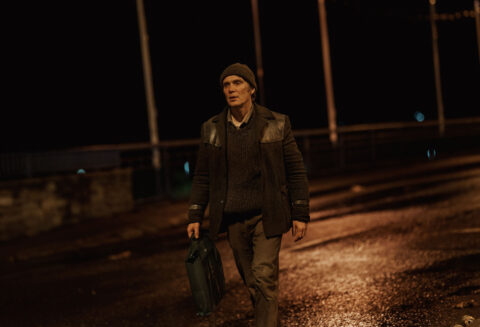The Irish, at least in the movies, are world-class prevaricators. Beating around the bush is their national sport. The truth may be out there, but they’re never going to say it out loud. They will endlessly dance around the subject, couching any reservations they may have in euphemisms or diminishments. Case in point: Berlinale competition opener Small Things Like This (Tim Mielants, 2024), its very title downplaying the tragic, epic significance of its subject matter.
Downbeat, downtrodden and often downright defeatist, this poetic adaptation of Claire Keegan’s 2021 novella lives in the spaces between the said and the not-said, in how decades of human rights abuses were free to exist thanks to the particularly Irish tendency to avoid the bitter truth of the matter.
Cillian Murphy stars as Bill Furlong, a coal merchant shipping his wares all across town in remote County Wexford. His career is not incidental. By the mid-80s, powering houses entirely by coal already feels like an anomaly. And if it weren’t for the sounds of The Human League’s 1984 Christmas number one “Don’t You Want Me,” you might think this movie was set decades before.
One day in the run-up to Christmas, Bill is schlepping coal to a convent, when he sees a young girl, forced against her will, to enter behind those secretive and secluded walls. Aping prison and concentration camp imagery, this moment gives us a brief glimpse into an institutional disgrace.
These are the Magdelena Laundries, whereby so-called “disgraced” women — pregnant out of wedlock; raped; mentally challenged; sexually active — were sent, often for life, to become laundry women. The last one was shut in 1996. Some historians say the turning point was the 1993 discovery of 155 unmarked graves. Others say it was the invention of the washing machine.
From the foundation of the free state of Ireland in 1922, it was estimated that at least 10,000 women passed through those walls. And thanks to the obstinance of religious orders such as the Sisters of Mercy, who refuse to turn over records or pay out compensation, true justice and reconciliation for this state-sanctioned widespread misogynist abuse has yet to be genuinely established.
This is a very serious subject matter. As an opener, it makes a welcome change from the lightweight New York nonsense of She Came To Me (Rebecca Miller, 2023) or the redundant remake of Peter Von Kant (François Ozon, 2022). I’d be happy for this film to follow in the footsteps of The Magdalene Sisters (Peter Mullan, 2002) in drawing more attention to this monstrous practice.
Alas! I am not running a political website — although politics are often important and inextricable from the aesthetics — but a film criticism website. And on an aesthetical level, Small Things Like These simply does not work.
Let’s start with the obvious. Cillian Murphy, producing the film through his new company Big Things Films, is very good. By the time this film hits wide release, he will have been anointed the Best Actor at the Oscars for his work in Oppenheimer (Christopher Nolan, 2023). Both Nolan and Mielants recognise that Murphy’s greatest asset is his piercing blues eyes, shrunken and concave, encompassing great knowledge, and with it, great suffering. Multiple close-ups of Murphy’s face, shot from below, allow him to sit with his grief, powerless to make a difference in the face of towering institutions.
But neither Murphy nor Emily Watson (playing a terrifying Mother Superior), nor the rest of the competent cast can rescue Small Things Like These from its subpar imitation of Terence Davies’ best work, most notably Distant Voices, Still Lives (1988). From the slow camera pans, surveying domestic scenes, to the lateral camera movements, to the weak attempts to collapse Bill’s past and present as he confronts this brutal reality, the Liverpudlian’s precise imagery is co-opted in often blatant and unsatisfying ways.
Using a tight aspect ratio, the Belgian director tends to shoot through windows and doorways, capturing hands and clothes and other small things like these. While these complicated layered frames may stress the layers of secrets that permeate throughout Irish society, they do little to highlight the urgency of any particular scene, especially as the eventual revelations can be obvious and the conflict lacking in heightened emotion.
What’s left is a particularly mild-mannered work that’s as reticent as the people it is trying to portray. Something so big shouldn’t feel so small.

Redmond is the editor-in-chief of Journey Into Cinema.




